|
De Britse schrijver Alan Hollinghurst werd geboren op 26 mei 1954 in Stoud, Gloucestershire. Zie ook alle tags voor Alan Hollinghurst op dit blog.
Uit: The Swimming Pool Library
“Yet only this year I had been with boys called just those staid things; and they were not staid boys. Nor was Arthur. His name was perhaps the least likely ever to have been young: it evoked for me the sunless complexion, unaired suiting, steel-rimmed glasses of a ledger clerk in a vanished age. Or had done so, before I found my beautiful, cocky, sluttish Arthur-an Arthur it was impossible to imagine old. His smooth face, with its huge black eyes and sexily weak chin, was always crossed by the light and shade of uncertainty, and met your gaze with the rootless self-confidence of youth.
Arthur was seventeen, and came from Stratford East. I had been out all that day, and when I was having dinner with my oldest friend James I nearly told him that I had this boy back home, but swallowed my words and glowed boozily with secret pleasure. James, besides, was a doctor, full of caution and common sense, and would have thought I was crazy to leave a virtual stranger in my home. In my stuffy, opinionated family, though, there was a stubborn tradition of trust, and I had perhaps absorbed from my mother the habit of testing servants and window-cleaners by exposing them to temptation. I took a slightly creepy pleasure in imagining Arthur in the flat alone, absorbing its alien richness, looking at the pictures, concentrating of course on Whitehaven’s photograph of me in my little swimming-trunks, the shadow across my eyes… I was unable to feel anxiety about those electrical goods which are the general currency of burglaries-and I doubted if the valuable discs (the Rattle Tristan among them) would be to Arthur’s taste. He liked dance-music that was hot and cool-the kind that whipped and crooned across the dance-floor of the Shaft, where I had met him the night before.
He was watching television when I got in. The curtains were drawn, and he had dug out an old half-broken electric fire; it was extremely hot. He got up from his chair, smiling nervously. ‘I was just watching TV,’ he said. I took my jacket off, looking at him and surprised to find what he looked like. By remembering many times one or two of his details I had lost the overall hang of him. I wondered about all the work that must go into combing his hair into the narrow ridges that ran back from his forehead to the nape of his neck, where they ended in young tight pigtails, perhaps eight of them, only an inch long. I kissed him, my left hand sliding between his high, plump buttocks while with the other I stroked the back of his head. Oh, the ever-open softness of black lips; and the strange dryness of the knots of his pigtails, which crackled as I rolled them between my fingers, and seemed both dead and half-erect.”
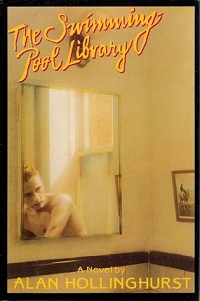
Alan Hollinghurst (Stoud, 26 mei 1954)
Cover
De Egyptische schrijfster en literatuurwetenschapster Radwa Ashour werd geboren op 26 mei 1946 in Caïro. Zie ook alle tags voor Radwa Ashour op dit blog.
Uit: Siraaj. An Arab Tale (Vertaald door Barbara Romaine)
“But she was never away for more than a month, after which she would return to spread gloom and fear wherever she went in her fancy sandals. An austere and coldhearted woman she was, who never smiled—had the hardness of her heart spread to her entrails, turning them to stony ground in which no seed could take root, or had her heart turned to stone from grief over the absence of offspring? Amina pondered as she stood before the fire flattening the loaves. The absence of children wouldn't harden a tender heart. Ammar used to hide lumps of sugar in his pocket for Saïd—Ammar, cut off like a tree limb, fatherless, motherless, wifeless, and childless, yet for all that, he spread as the branches of jasmine spread over the walls of the houses, telling the children stories that they would then demand from their mothers at bedtime: "We want one of Ammar's stories"—the same stories he had told Amina when she was a child.
"Tell me a story, Ammar . . ."
"The story of the frog who married two wives and took to croaking his complaints all night long, or the story of the box in which the children collected stars?"
"The story of the sun and the moon."
Ammar told her the story, and Amina laughed, clutching the hem of his jilbaab to keep him from leaving her.
"I must return to the palace, Amina."
"I'll let you go after you tell me the story of the box of stars."
So he would tell her the story and then go to work.
"The absence of children wouldn't harden a tender heart," murmured Amina as she attended to her baking.“
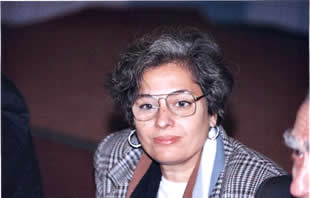
Radwa Ashour (26 mei 1946 – 30 november 2014)
De Belgische schrijver Hugo Raes werd geboren in Antwerpen op 26 mei 1929. Zie ook alle tags voor Hugo Raes op dit blog.
Uit: Een faun met kille horentjes
“Sommige heren roken dan een sigaret, liggend naast de dieprustende vrouw, overweegt hij. Sommige harde knapen doen zelfs een trekje tijdens. Maar hij rookt niet. En zij is niet rustig. Ze ageert eerder zenuwachtig. En nu nog de slaap te pakken krijgen, dat zal wat worden, zegt ze. Ze trekt enkele kledingstukken naar zich toe, per ongeluk de sprei meetrekkend. O! De slaap, zegt Michael H. geleerd en zelfzeker, de slaap is iets wat je moet kunnen doorgronden, bestuderen. De mens is eigenlijk een verpest wezen. Zijn slaap, althans bij de stadsmens, de intellectueel, komt moeilijk. Misschien is het slaapgodje, het vuige zandmannetje ons voosgezind en zouden wij hem moeten paaien, wellicht geschenkjes, offers brengen. Heu! doet zij nerveus, en een beetje mannelijk, vindt hij plots en zonder reden. Heu, zo ken ik een vrouw die, als ze de slaap niet kan vatten, opstaat en muntstukjes begint op te poetsen met metaalpolish.
Dan kun je al beter trompet spelen, zegt Houtdrager. Nee, laat ons terugkeren tot mijn proefondervindelijke vaststellingen: ik heb het zonder hem proberen doen, buiten Klaas Vaak om, bedoel ik: de slaaptablet, de alcohol - alhoewel ik bepaald geen drinker ben - het geeft me een vilten gevoelen, Vilt op gevild vlees. En de uitputting, ook geprobeerd. Maar is het niet eigenaardig dat, ook uitgeput, en moe, wij de slaap vaak niet kunnen vatten door de gedachten? Altijd maar gedachten die opduiken, de ene na de andere, met tientallen worden ze tegelijk uit mekaar geboren. Wanneer ze onsamenhangend worden, dan is het inslapen nabij, had ik ondervonden wanneer ik slaappoeders innam. En als je autosuggestie gebruikt, ook. Wanneer de gedachten, de beelden incoherent worden, dan kan men inslapen. Dit is het sein, het eerste teken dat het onbewuste of onderbewuste overneemt. Ik beproefde het dus omgekeerd. Wanneer de gedachten maar oprijzen, opduiken, zich vermenigvuldigen, tracht ik mij eerst zo ontspannen mogelijk te leggen, mij zo loom mogelijk te voelen. In de winter het daarom warm genoeg hebben. Met koude voeten gaat het niet.”
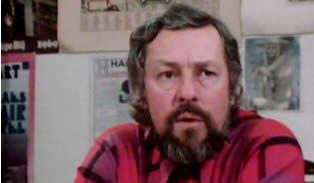
Hugo Raes (26 mei 1929 – 23 september 2013)
De Tsjechische dichter en vertaler Vítezslav Nezval werd geboren op 26 mei 1900 in Biskoupky. Zie ook alle tags voor Vítězslav Nezval op dit blog.
Bizarre Town
2
Under the slender Gothic arch
Of a water tower
Stands
A beardless young man
Lamp in hand
In his vaulted chest
A bell
When he coughs
The bell rings
And in the town
Open
In one fell swoop
All the windows
13
From dormer windows
Stretch
Tilted upward
Toward the west
Long and beautiful hands
In white gloves
Bedecked with
Diamond jewels
Getting
Rained on
Vertaald door Stephan Delbos en Tereza Novická
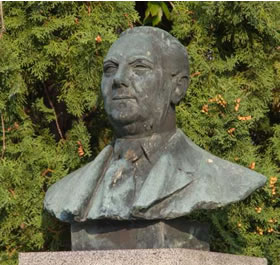
Vítězslav Nezval (26 mei 1900 – 6 april 1958)
Borstbeeld in Dalešice
De Belgische, Franstalige, schrijver en essayist Ivan O. Godfroid werd geboren in Boussu op 26 mei 1971. Zie ook alle tags voor Ivan O. Godfroid op dit blog.
Uit: Glam dicinn
« Il dut attendre à bonne distance, luttant contre l’asphyxie. Et le bénitier s’ouvrit à nouveau, brisant l’obscurité sourde et oppressante. C’est à cet instant que le pêcheur la vit pour la première fois. Elle était d’une beauté nacrée, à la fois fragile et éternelle. Elle semblait s’éveiller, et ses yeux d’albâtre grandissaient à mesure que, doucement, elle se dressait. Il voulut la regarder encore, mais son corps implorait, et il remonta.
Le jeune pêcheur n’arriva pas à oublier cette vision sublime un seul instant de la nuit qui suivit, ni d’ailleurs les nuits suivantes. Il se sentait le jouet d’un amour sans limite. Alors il y retourna, jour après jour, délaissant son labeur, ne plongeant plus que pour l’apercevoir. Mais chaque fois qu’il voulait s’approcher, le tridacne se refermait – et le temps qui s’écoulait avant qu’il ne s’ouvre à nouveau grandissait. Il comprit qu’il risquait de ne plus jamais la revoir. Ce jour-là, et tous les jours qui suivirent, il demeura sans bouger, volant à chaque fois quelques battements de cœur de plus. La dévorant des yeux.
Jamais la nixe ne vit le pêcheur. Et jamais le pêcheur n’approcha la nixe.”

Ivan O. Godfroid (Boussu, 26 mei 1971)
De Amerikaanse dichter en schrijver Maxwell Bodenheim werd geboren op 26 mei 1892 in Hermanville, Mississippi. Zie ook alle tags voor Maxwell Bodenheim op dit blog
Dialogue Between a Past and Present Poet
PAST POET
I wrote of roses on a woman's breast,
Glowing as though her blood
Had welled out to a spellbound fierceness;
And the glad, light mixture of her hair.
I wrote of God and angels.
They stole the simple blush of my desire
To make their isolated triumph human.
Knights and kings flooded my song,
Catching with their glittering clash
The unheard boldness in my life.
Gods and nymphs slipped through my voice,
And with the lofty scurrying of their feet
Spurned the smirched angers of my days.
PRESENT POET
You raised an unhurried, church-like escape.
You lingered in shimmering idleness;
Or lengthened a prayer into a lance;
Or strengthened a thought till it heaved off all of life
And dropped its sightless heaven into your smile.
Life, to us, is a colourless tangle.
Like madly gorgeous weavers
Our eyes reiterate themselves on life.
PAST POET
My towering simplicity
Loosening an evening of belief
Over the things it dared not view,
Gladly shunned reality
Just as your mad weaver does.
PRESENT POET
Reality is a formless lure,
And only when we know this
Do we dare to be unreal.
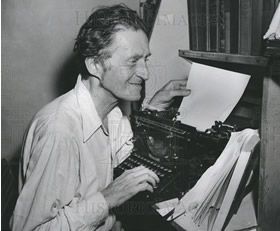
Maxwell Bodenheim (26 mei 1892 – 6 februari 1954)
De Duitse schrijfster Isabella Nadolny (eig. Isabella Peltzer) werd geboren op 26 mei 1917 in München. Zie ook alle tags voor Isabella Nadolny op dit blog.
Uit: Ein Baum wächst übers Dach
„Führte man jedoch Leute dorthin, um ihnen diese Pracht zu zeigen, so nebelte sich das Gebirge ein, und man war gezwungen, mit einer weiten Armbewegung zu sagen: »Schade, was ihr dort nicht seht, das sind die Ostalpen!« An dieser Eigenheit Seehams hatte sich seit dem Jahre 1910 kaum etwas geändert.
Im übrigen war Seeham ein ganz gewöhnliches Dorf mit Spritzenhaus und Viehwaage, einem Bach mit Enten und Forellen, mit drei Dorftrotteln, zwei Kropfträgern und einer Schwäche für den Fremdenverkehr. Schon in den guten alten Zeiten vor meiner Geburt hatten die Eltern alljährlich samt Mädchen und Großmama eine Etage in einer jener Villen gemietet, die in so manchen Dörfern Oberbayerns herumstehen und deren Dächer in eine Unzahl sinnloser Türmchen und Erkerchen ausblühen. Bei dieser Sommergewohnheit war man geblieben. Die Fotoalben im Salon, deren Messingbeschläge die Tischplatten zerkratzten, wenn man sie besah, waren voller Strandbilder: die fröhlichen Eltern, Fische räuchernd, Schwemmholz zusammentragend, Bruder Leo in gestreifter Badehose und schließlich eines Tages sogar ich, heidnisch nackt, die Korkenzieherlocken hochgebunden, damit sie nicht in den See hingen, mißvergnügt gegen die Sonne in die Kamera blinzelnd. Das war nun eine Weile her. Ich hatte nur noch Erinnerungen an die wundervollen Steine, die ich sorgfältig abwusch und wieder ins Wasser legte.
Bruder Leo zeichnete noch immer an seinem Plan. Papa schob die Patiencekarten zusammen und sah ihm über die Schulter.
»Das Lange dort, soll das eine Kegelbahn werden?«
»Das ist eine Veranda«, sagte Leo.
»Wir werden ja hauptsächlich draußen essen«, sagte Mama entschieden. Essensgeruch war ihr stets zuwider, sie fand ihn spießig.
»Du kennst Oberbayern noch immer nicht genügend, scheint’s«, sagte Papa sanft und schloß leise die Tür hinter sich.“

Isabella Nadolny (26 mei 1917 – 31 juli 2004)
Cover
Onafhankelijk van geboortedata:
De Nederlandse dichteres Machteld Brands werd geboren in 1986 in Kampen. Zie ook alle tags voor Machteld Brands op dit blog.
Blad
Ik drijf op jouw vijvers
als een lelieblad.
Groot en groen
waan ik mij ongrijpbaar
denk ik mij ongegrond
ongeworteld
en van aarde vrij.
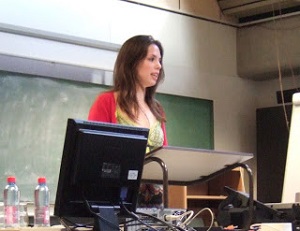
Machteld Brands (Kampen, 1986)
Zie voor nog meer schrijvers van de 26 mei ook mijn blog van 26 mei 2014 en ook mijn blog van 26 mei 2013 deel 2.
26-05-2016 om 00:00
geschreven door Romenu 
Tags:Alan Hollinghurst, Radwa Ashour, Hugo Raes, Vítě,,zslav Nezval, Ivan O. Godfroid, Maxwell Bodenheim, Isabella Nadolny, Machteld Brands, Romenu
|

